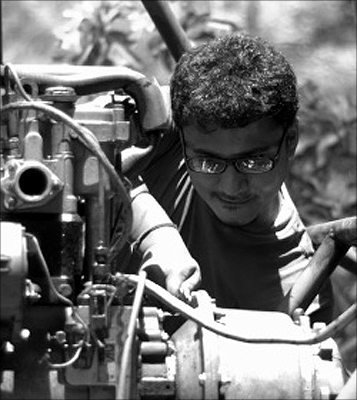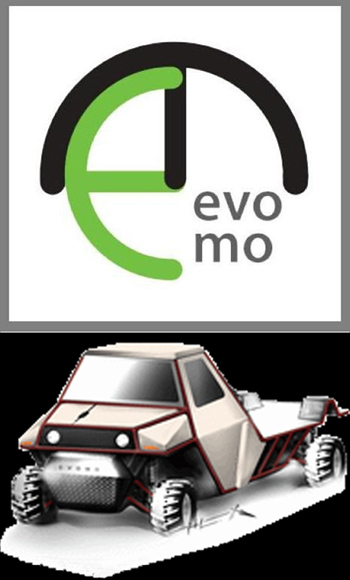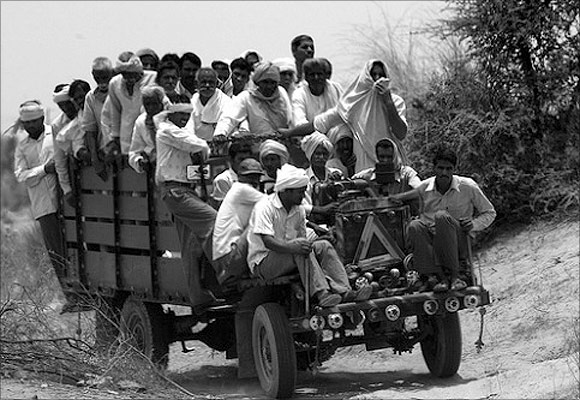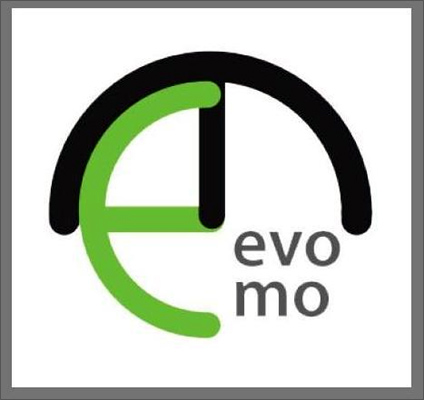 | « Back to article | Print this article |
Move over jugaad, here comes Evomo
The Ahmedabad-based start-up has developed a rural utility vehicle which can make travel safe and comfortable.
Abhinav Das, a young mechanical engineer from Delhi, was just 22 when he quit his cushy job during the Christmas of 2008 to pursue his dream of revolutionising rural mobility.
He founded Evomo Research and Advancement Company Pvt Ltd in June 2010, to design and manufacture what he calls the rural utility vehicle or RUV.
Thereafter, he moved to the National Design Business Incubator (NDBI) at the elite National Institute of Design (NID) in Ahmedabad, where he was given a workshop and office space. NID also gave around Rs 6 lakh as seed funding.
However, Das’ journey has not been smooth. For one, since its inception in June 2010, his company hasn’t sold a single product. Nor has it registered any revenue in its books. To top it all, Das could not find an investor to take his project to the next level. He is also awaiting the relevant certification for his products, without which the product can’t ply on the road.
Despite all these setbacks, Das is holding on to his ground, working persistently in his workshop, perfecting his prototype.
Click NEXT to read more...
Photographs, courtesy: Evomo
Move over jugaad, here comes Evomo
The beginning
Evomo means evolving mobility. The idea to develop an RUV stuck Das at a conference organised by the Society of Indian Automobile Association (Siam), where he happened to see a ‘jugaad’, an improvised vehicle commonly found in the rural parts of Uttar Pradesh, Punjab, and Haryana.
Das wondered how thousands of jugaads happen to ply in the rural areas. He realised that villagers buy jugaad as they do not have many options.
Jugaads are made of motor scrap, old parts from utility vehicles, wooden planks and sometimes powered by water pumps. Needless to say, such vehicles are unsafe to ply on the roads.
Jugaads are illegal, too, as they do not have any certification from the Automotive Research Association of India (ARAI) or the International Centre for Automotive Technology (ICAT).
“We also did a study on mobility to understand the prime reasons for travel in rural areas, whether it is for education, health or for business, so that we could come up with a targeted solution,” Das says.
Click NEXT to read more...
Move over jugaad, here comes Evomo
Developing the product
During his college days at Delhi’s Guru Gobind Singh Indraprastha University, Das had made a prototype vehicle. “It was more of a motor-sport vehicle. We designed it into a pick-up truck, and thought of using steel tubes in place of sheet metal components,” he recollects.
Sheet metal needs equipment to bend it and, hence, is more expensive. In comparison, using tubes not only gives an economic advantage but also renders strength to the structure.
The basic prototype was ready by 2011 but Das and his team kept improvising it, based on inputs during field trials. The final prototype was ready in January 2013.
The RUV is a basic vehicle with a proprietary chassis design, a body made of steel and fibre and an Euro-II engine from Greaves Cotton. While it will cost around Rs 1.5 lakh, Das claims it would give 20 km a litre.
The 600-cc single cylinder engine that powers the vehicle (12 HP and 3,600 RPM), is distinct from what a typical jugaad vehicle uses, which are mainly non-automotive engines. The vehicle can carry up to 2,000 kg of load.
Click NEXT to read more..
Move over jugaad, here comes Evomo
The hurdles
The biggest hurdle is to find an investor to fund his project. “We are open to investments from angel investors, private equity or venture capital funds. But, nothing has come through till now,” says a disappointed Das.
What keeps him going? “Our vehicle could change the lives of villagers. This thought is very inspirational, and it keeps us going,” he says.
Roads are the dominant means of transportation in India today. They carry almost 90 per cent of the country’s passenger traffic and 65 per cent of its freight, says Das. “Every year, accidents claim hundreds of thousands of lives, many of which happen in rural areas due to lack of safe forms of transport.”
Why are institutional investors not interested in his project? “They say if there is such a huge need gap, why aren’t the auto majors trying to tap into this market?” says Das.
Shashank Rastogi, chief operating officer of the Centre for Innovation, Incubation and Entrepreneurship at IIM-Ahmedabad, has seen the start-up closely. He says: “For investors in India, multiple factors play a role when deciding to invest in a particular company, which includes the industry in which the start-up is operating. There is a lack of success stories in product category start-ups, especially automotive. There is hardly any other company which has built an automotive product from scratch.”
According to him, setting up a rural distribution set-up would not only require a lot of money but there are executional issues as well. “While jugaad is an unorganised industry, it is already established, people know where to go to get one. For Evomo, the major challenge would be to get people to know there is an alternative to jugaad available. Das and his team have already started taking steps in this direction, like participating in the Pushkar cattle fair, for instance.”
Rastogi says the idea has immense potential. “The only problem is in execution, which is why large investors are shying away.”
Niraj Chandra, director of Atul Auto, which sells 60-70 per cent of its vehicles (three-wheelers) in the rural market, also feels jugaad customers would shift to buying Evomo’s RUV. “Once a local option is available, it will take time to get into the market to gain visibility. But, the price factor will also play a part. Many jugaad buyers could shift to Evomo’s RUV if priced attractively at Rs 1.5 lakh.”
Click NEXT to read more...
Move over jugaad, here comes Evomo
The road ahead
The Evomo team needs to raise funds worth Rs 2.3 crore to set up their first manufacturing facility and get ARAI or ICAT certification. “We are looking at locations in Gujarat for setting up a manufacturing unit. We would require around 600 square yards,” says Das.
The start-up targets an initial production of 50 units a month and to launch a test marketing pilot. “We plan to give one vehicle to opinion leaders in the village communities, targeting villages around Ahmedabad, and then take their feedback,” he elaborates.
The Evomo team had taken their RUV to the Pushkar cattle fair in November 2012. “We are still getting enquiries from people who had seen our vehicle there. These are poor people, with an average income of around Rs 50,000 a year. If a person can have access to our vehicle, he can improve his earnings by around 75 per cent in a year,” claims Das.
Once the product is certified by ARAI or ICAT, Evomo plans to have satellite workshops or small-scale manufacturing set-ups across different districts and covering several states. These plants will be easy to build and operate, and Evomo plans to adopt a franchisee model to expand its manufacturing without much investment. “If we manage to sell 1,700 vehicles at Rs 1.5 lakh, we would break even, or be cash-flow positive,” says Das.
While no official data is available on the size of the rural utility vehicle market, Evomo team’s research puts it at around 15,000 a year in Punjab and Haryana. They have found 150,000 ‘chhakdas’ ply on Gujarat roads, while around 200,000 Vanos are running on the roads of West Bengal and Bihar.
“Rural people would travel as far as 500 km to get a jugaad. Once the consumer knows a viable alternative exists, word of mouth publicity would help sales,” says Rastogi.
On what has kept Evomo from getting a certification, Rastogi says the start-up has an alpha version prototype ready. “Das needs some more money to develop more variants that can be tested at a lab or for road-testing to be done by the certification agency. One problem about getting certification is, you cannot get it on the basis of a single product prototype.”
But the franchisee model can have its share of drawbacks as well, Rastogi warns. “While it cuts down on fund requirements drastically, it raises issues with quality assurance. It is like a double-edged sword.”
According to Rastogi, the start-up can go for bank finance. However, to raise money from banks, Das’ company should have a healthy balance sheet, he adds. “Once an angel investor pumps in some funds, the balance sheet improves, and Evomo can raise debt from the market.”
According to Chandra, the rural customer wants return on investment, a maintenance-free vehicle, and easy availability of spare parts. “He uses his vehicle as a multi-purpose vehicle for both man and material.”





